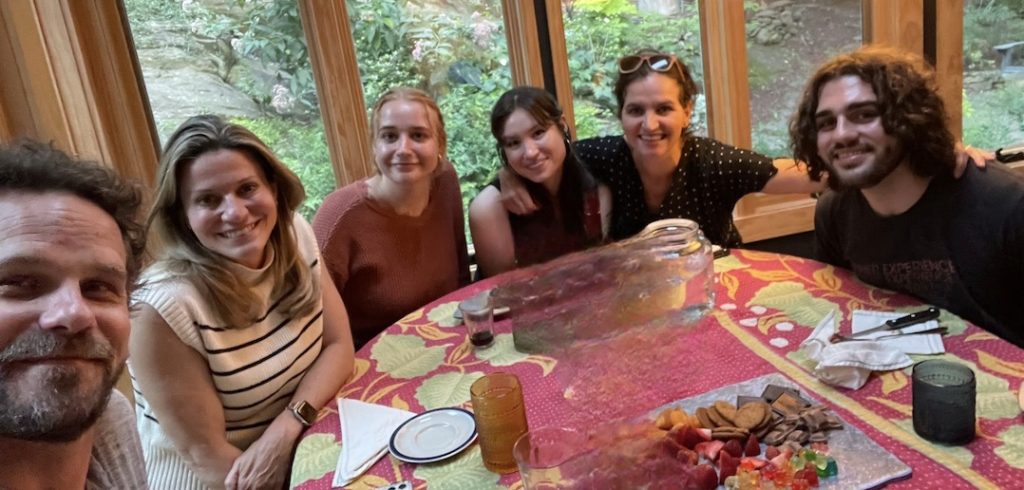“Sometimes the classroom can be such a formal atmosphere,” said Moore, who teaches theology at Fordham, along with Seitz, her husband. “Just seeing them lying on the floor with my dog, petting her, and telling us about terrible high school summer jobs they’ve had, just being more human—it was so sweet.”
This summer, Moore served as a faculty mentor to three undergraduates participating in Fordham’s summer research programs: Laura Oldfather, a theology student at Fordham College at Lincoln Center who is revitalizing Ignatian spirituality for a new generation; Amara Overmyer, an English student at Fordham College at Lincoln Center who is writing stories about a local nonprofit; and Christopher Ciaccio, a philosophy student at Fordham College at Rose Hill who is imagining alternatives to capitalism using 20th-century French mystical thought. (The students’ research is, respectively, funded by Fordham College at Lincoln Center, the Center for Community Engaged Learning, and Fordham College at Rose Hill.)
In mid-July, Moore and Seitz invited the students to their home in Hastings-on-Hudson for dinner, along with their theology colleague Stephanie Arel. While eating a homemade meal prepared by Moore—roasted chicken, potatoes, goat cheese salad, and watermelon—the students and scholars shared their research and the things they care about.
“They all are readers, writers, and thinkers who are doing super cool work this summer, and it was great to have a chance to think and learn together,” said Moore, who hosted students at her home last spring, too.
Ignatian Spirituality for Gen Z
Oldfather, who is originally from Wisconsin, is a theology major. She said she is studying how scholars are adapting the spiritual exercises of St. Ignatius of Loyola to different cultures and audiences, particularly women, who were “often left out of the history of the Jesuits.”
“I’m looking at the work that people have done … and focusing on how this impacts a modern-day Fordham college student, like how the exercises would be applicable. As part of my research, I am writing a translation, updating some of the language. A lot of it is changing pronouns in places, making it gender-neutral. In some places, the language is very imperial or colonial, just because of the context of it being written in the 1500s,” said Oldfather, who will present her research at Fordham’s spring symposium next year.
An Internship That Combines Writing and Humanitarian Work
Overmyer, an English student from California, is a summer intern at an East Harlem nonprofit that helps vulnerable families and children, where she is developing website biographies for the organization’s nearly 60 staff and board members.
At the dinner, she shared her work with the other students, who, in turn, broadened her perspective on theology and philosophy. (Her favorite part of the get-together, however, was meeting Moore and Seitz’s three-and-a-half year old golden retriever, Mosey: “I have slobber and hair all over my skirt that I wore that day, but it was worth it,” she said.)
Moore said that she and her husband love seeing students in their “full humanity.”
“We are, as humanities scholars and lecturers and students, studying human culture and civilization,” said Moore, “and it’s so much more interesting to do that when we show up in our full humanity, too.”

